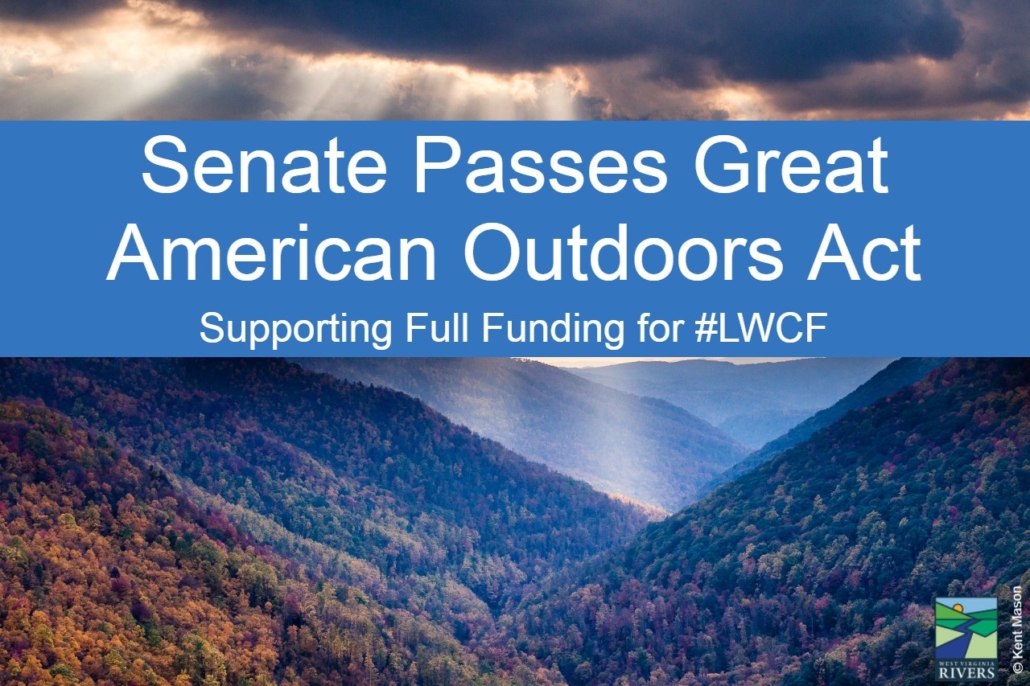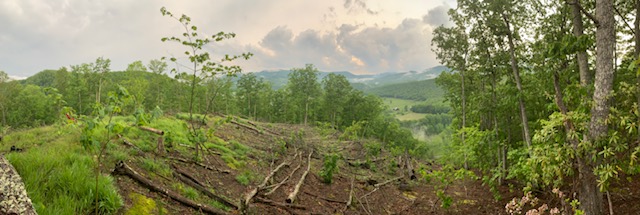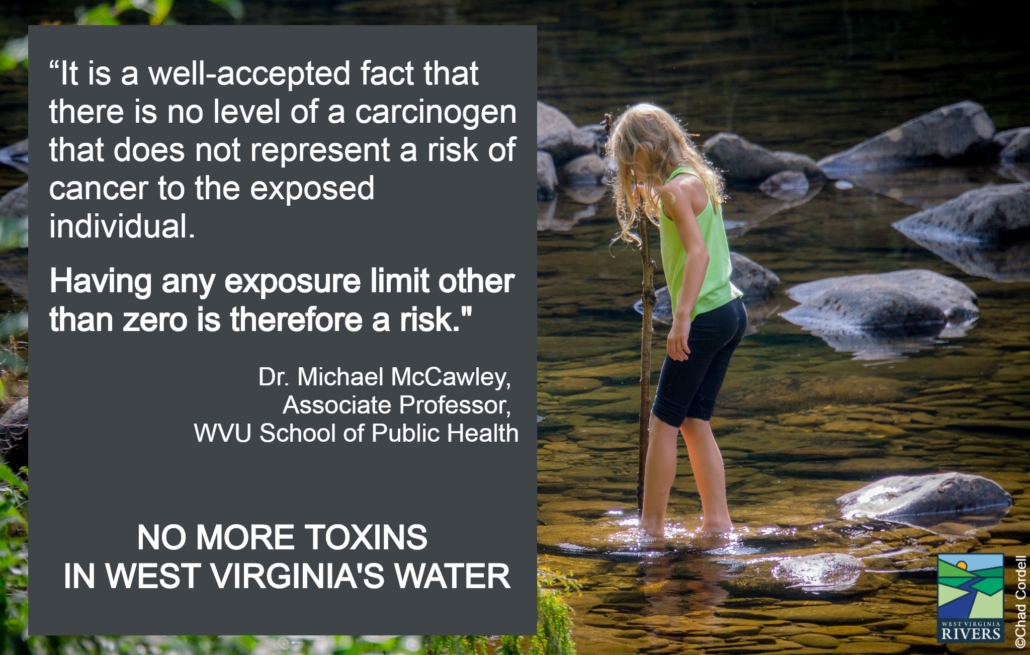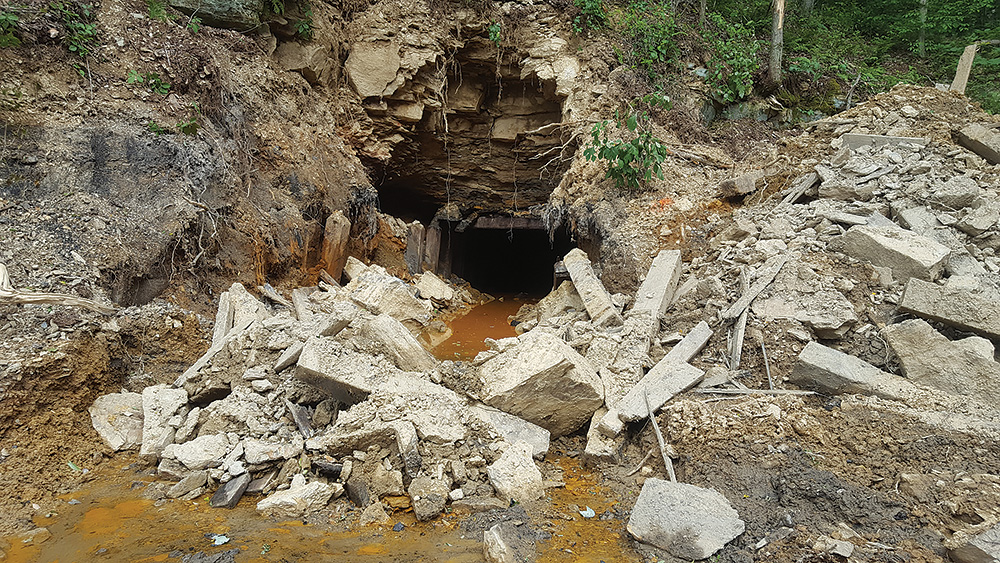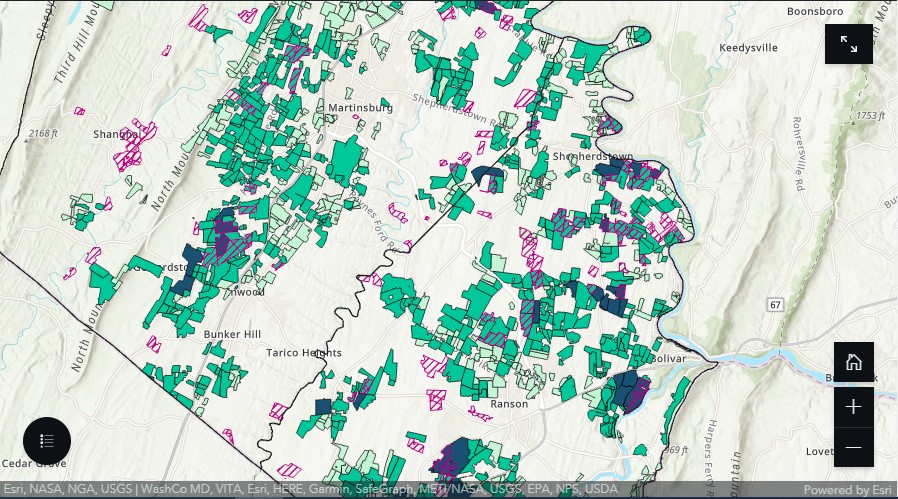WV Rivers News: ACP Abandoned, Water Quality Standards Update, Congress Moves on Pro-Environment Bills
House Gets Ready to Vote on Historic Great American Outdoors Act
In late June, the Senate passed the Great America Outdoors Act, an important legislative package which ensures that the Land and Water Conservation Fund receives full program funding each year without going through a drawn-out appropriations process which often leaves it underfunded. LWCF supports the development of recreation and conservation projects, bolstering West Virginia’s outdoor recreation economy.
The Act also begins to address the maintenance backlog that is plaguing our public lands. Providing funding for repairs to roads, trails, recreation sites, bridges, buildings, and water systems.
Both of West Virginia’s Senators are strong supporters of the Act and have championed the bill as it moved through the Senate. But, don’t take their leadership for granted! Every time you responded to a call to action on public lands legislation you encouraged West Virginia’s Senators to become advocates for West Virginia’s wild & wonderful public lands and waters! Now, we need to turn up the heat on members of the House as they prepare to vote on the Act at the end of the month. Please contact your Representative today and encourage them to support the Great American Outdoor Act.
Dominion and Duke Abandon the Atlantic Coast Pipeline
Tree clearing for the ACP near Clover Lick in Pocahontas County. Photo by Tanner Haid.
In early July, the news broke that the 600-mile Atlantic Coast Pipeline (ACP) was abandoned by parent companies Dominion and Duke. Increased costs and ongoing delays were cited as reasons for the decision. Read our full coverage of the announcement here.
What does this mean for our water? We’re still watching to see what happens next, but there are a couple scenarios that might happen: ACP might be forced to remove the abandoned pipe and reclaim the area; or another company may decide to try to finish what they started. Either way, we all need to stay vigilant to ensure that our rivers and streams are not further degraded by this project.
If you’d like to join WV Rivers in advocating for streams in the path of pipelines, please consider making a tax-deductible donation.
Update: WVDEP Finalizes Water Quality Standards Recommendations
In late June, the WVDEP’s Environmental Protection Advisory Council (EPAC) met to discuss the WVDEP’s proposed recommendations for the state’s water quality standards. Following the EPAC meeting, it’s clear that the WVDEP had chosen to align their proposed water quality standards rule with the requests of the WV Manufacturers Association. Read our full story on WVDEP’s decision here.
In WVDEP’s newly revised water quality standards rule WVDEP is only choosing to update limits for 24 toxins (out of 94 EPA recommended updates) – 13 of which would be weakened. Additionally, WVDEP now recommends the development of a “workgroup” to study the remaining toxins and develop standards. This further delay of adopting recommended human health protections leaves our citizens at unnecessary risk.
As disappointing as this proposal is, it’s important to remember that it’s the West Virginia Legislature that will determine the final water quality standards rule. The Senators and Delegates we vote for in November will have the final say on water quality standards. Please, research the candidates and make informed decisions when you cast your vote on November 3.
Climate, Water, and Justice with Marshall University’s Dr. Logan – 7/17
No one can escape the effects of climate change, but some communities are more vulnerable to the risks of the climate crisis. This is especially true for minority communities in West Virginia.
Dr. Georgiana Logan, an assistant professor of health science and a research associate for the Minority Heath Institute at Marshall University, is one of our nation’s leading experts on climate, public health, and environmental justice. On July 17, Dr. Logan will share her expertise during a free webinar as part of WV Rivers’ WV Climate and Water Series.
This webinar has been approved for one hour of Category One continuing social work education, learn more and register here.
Bill Supporting Clean Water and Wildlife Moves Through Congress
Acid mine drainage from an abandoned mine. Photo courtesy of Friends of the Cheat.
The Great American Outdoors Act isn’t the only bill moving through congress that gives the environment at boost. Legislative package H.R.2, the Moving Forward Act, cleared the House late last month and now heads to the Senate.
This infrastructure package emphasizes natural solutions to improve water quality, help wildlife, and tackle climate change through key provisions like:
- Increasing funding for the Clean Water State Revolving Fund to $8 billion annually, which will better enable states to address their significant water infrastructure improvement needs.
- Including the RECLAIM Act and authorizing the use of $1 billion over five years in un-obligated money from the Abandoned Mine Land fund for distribution to states and tribes to accelerate the cleanup of abandoned coal mine sites.
- Reauthorizing the Abandoned Mine Land reclaimation program for coal mines, which is expiring at the end of September 2021, for 15 years; increases the minimum amount of money that each state or tribe receives annually from $3 million to $5 million; and allows states to spend funds directly for abandoned mine related emergencies and then get reimbursed by the Office of Surface Mining Reclamation and Enforcement.
- Funding wildlife conservation efforts aimed at helping the 12,000 species of concern identified by the state wildlife agencies, including more than 1,600 U.S. species listed under the Endangered Species Act. This language is derived from the bipartisan Recovering America’s Wildlife Act, which has more than 180 cosponsors.
Learn more about H.R. 2 from our friends at the National Wildlife Federation, of which WV Rivers is proud to serve as NWF’s state affiliate.
Visualizing Drinking Water Protection Through Land Conservation
Drinking water protection relies on a diverse set of tools to ensure the water we depend on is safe. One of the ways we’re working to protect drinking water sources in the Eastern Panhandle is through land conservation – because what happens on land has a direct impact on water quality. Land conservation is complex and it truly takes a village to make it happen.
That’s why WV Rivers serves as the coordinator of the Safe Water Conservation Collaborative, a network of more than 25 partners working together with the mission “Protecting Drinking Water through Land Conservation.”
In June, the Collaborative published an interactive map to identify land in Jefferson and Berkeley Counties essential to drinking water safety. You can take a deep dive into the Collaborative’s Prioritization Map here.
Interactive Map Shows Water Quality Information for Local Waterways
The U.S. Environmental Protection Agency (EPA) recently released an updated version of “How’s My Waterway,” a website to help people find information on the condition of their local waterways. The website, uses GPS technology or a user-entered zip code or city name to provide information about the quality of local water bodies. Once you enter in your zip code or city name, you can click through the tabs to find information on swimming impairments, fish consumption guidelines, drinking water utility violations, and water quality monitoring data. There is so much information at your fingertips that one could easily get lost exploring this website!
I’m Afraid of That Water: A Collaborative Ethnography of a West Virginia Water Crisis
A new book published by West Virginia University Press takes an ethnographic look at the 2014 Elk River Chemical Spill and subsequent Water Crisis which left 300,000 West Virginias without access to safe water. While an academic publication, many readers will connect to the stories told by the affected individuals who contributed to the book.
WV Rivers’ executive director, Angie Rosser, provides the afterword for the book.
Learn more and read excerpts from I’m Afraid of That Water: A Collaborative Ethnography of a West Virginia Water Crisis in Marshall University’s Graduate Humanities newsletter.
WV Rivers in the News
Efforts underway to save natural gas pipeline; environmental fight looms
Millions of Americans think they’re safe from flood waters. They aren’t
State DEP advisory council creates work group to retool human health parameters for water pollution
West Virginia environmentalists criticize proposal to relax water protections
State Oil And Gas Office Faces Budget Shortfall, Anticipates Layoffs
DEP public hearing draws criticism for plan to weaken some water pollution measures; delay action on others
The Great American Outdoors Acts Implications For Ruffed Grouse Brook Trout Restoration Projects
Manchin lauds Great American Outdoors Act as a huge step forward

